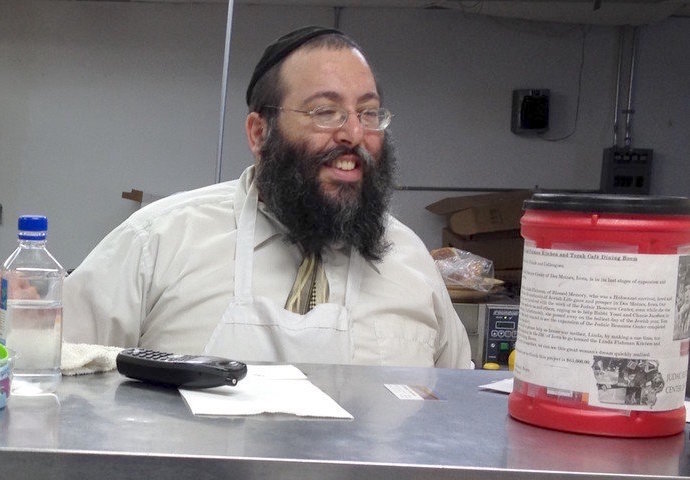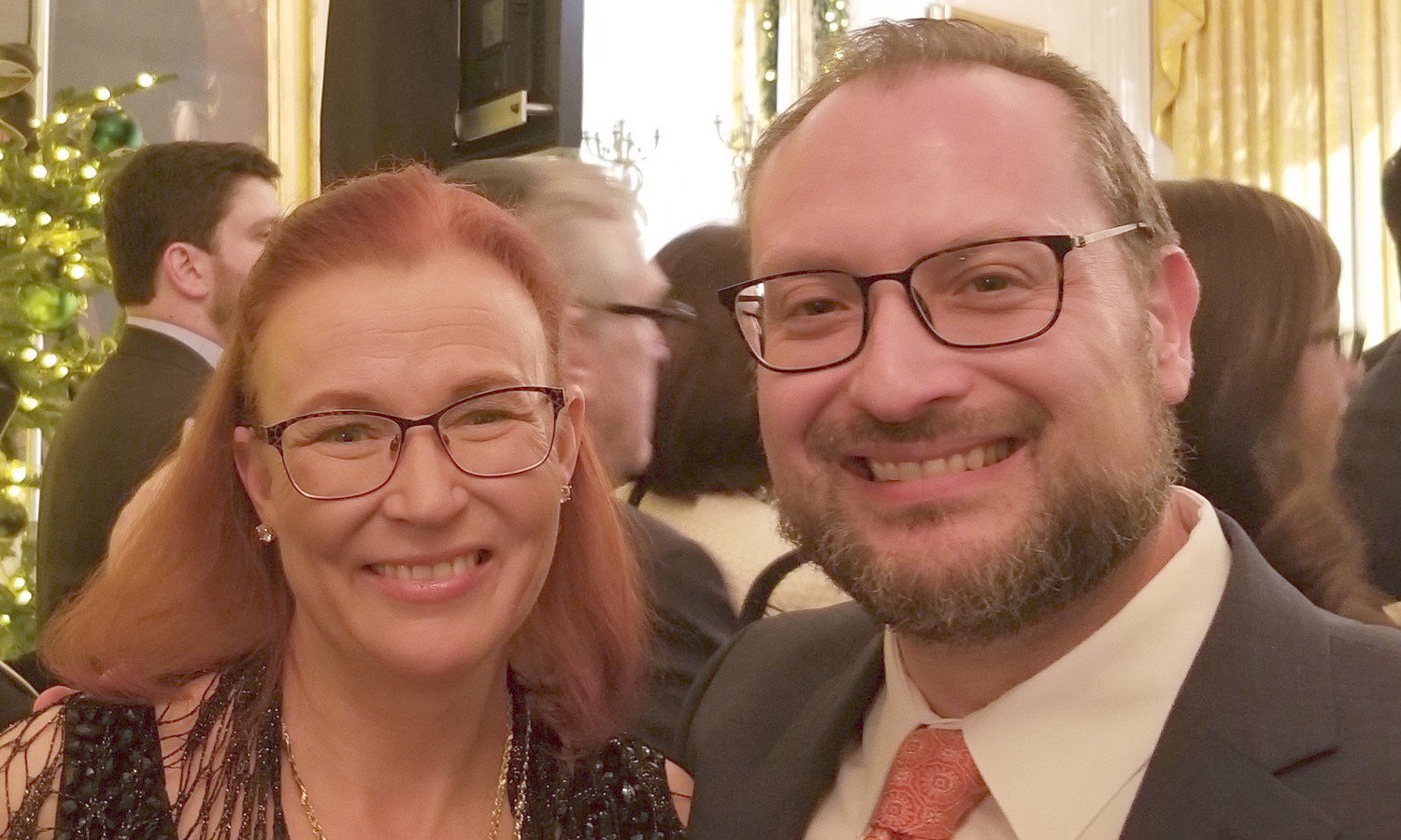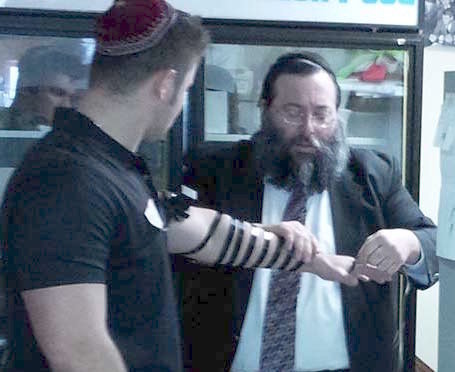Jews play outsize role in the Iowa caucuses
DES MOINES — As the Iowa Caucuses approach, the state’s Jewish community — numbering around 5,450, or less than 1 percent of the population — has been anything but missing from the action.
“We are a disproportionate share of the voter turnout,” said David Adelman, a Democratic political consultant who is a former president of the Jewish Federation of Greater Des Moines and currently president of the Federation’s foundation, which supports Jewish causes in both the Des Moines area and the State of Israel.
Iowa’s Jewish community is “overwhelmingly” Democratic, observed Drake University political-science professor Dennis Goldford.
“Iowans generally take their role as first in the nation’s caucuses -very seriously,” said Adelman, who is also chairman of the Iowa division of the American Israel Public Affairs Committee and serves on AIPAC’s national council. “I don’t think that’s any different with the Jewish community in Iowa.”
The Jewish Federation of Greater Des Moines declined an interview request, but sent JNS a statement by its communications relations director, Mark Finkelstein: “Like Jewish community members nationwide, Jewish community members in Des Moines tend to be vitally concerned with their political party at one level or another, and are typically not shy about expressing their opinions, certainly not to me as community relations director for the Federation.”
“If there’s anything the Federation stands for, however, is that we cannot let political divisiveness within the Jewish community stand in the way of the Federation attaining its mission — that of providing the social and educational services, the community-building services and programming which, in cooperation with our congregations enable our families to lead enriching Jewish lives here in Central Iowa,” added Finkelstein.
Iowans are known to take their first-in-the-nation caucuses, scheduled on Feb. 3, “very seriously,” from working or volunteering on campaigns to just bringing “in baked goods to feed the kids and help them” to providing lodging for campaign staff and volunteers, according to Will Rogers, a former secretary at the Jewish Federation and a former executive director of the Polk County Republican Party.
Truth be told, issues pertinent to the Democrats in Iowa’s Jewish community are no different than other groups: health care, the economy, abortion and immigration. Israel seems to be secondary compared to the kitchen-table issues
“If you get together with a bunch of Jewish citizens of Des Moines, talk will go to caucuses with the usual issues,” said Goldford. Bur :the community here is too small to let divisions and differences of opinion override the common concerns [of] the Jewish community.”
Harlan “Bud” Hockenberg, a veteran Republican operative and leader in the Iowan Jewish community, said that he’s lived his whole life as “a minority within a minority.” His “policy has always been that one friend can [have a] different policy, but that should never affect personal relationships,” he said.
Goldford said the small Jewish population in the state “don’t feel embattled,” though there is concern about the anti-Israel BDS movement.
And “as the process goes on, the Jewish community will identify candidates that speak to them on issues relating to the Middle East,” Adelman said.
“Israel tends to be a very important issue” on the Republican side, said Rogers, who added that the state’s Jewish Democrats support the Jewish state, though some are “a little more critical of Israel.”
Adelman noted that “multiple candidates or their staffs have reached out wanting to speak about the U.S.-Israel relationship. Many of these candidates are careful not to be baited by the far-left anti-Israel activists, knowing that the majority of the Democratic voters are still overly supportive of a strong U.S.-Israel relationship.”
There are three Jewish congregations in Des Moines — Tifereth Israel (Conservative), Temple B’nai Jeshurun (Reform) and Lubavitch of Iowa (Orthodox). In 2016, the historic Orthodox shul, Beth El Jacob, closed and is now partnered with Chabad.
B’nai Jeshurun, founded in 1873 as Des Moines’s first Jewish congregation, is Iowa’s largest. Its spiritual leader, David Kaufman, who has been in Des Moines for 16 years, tows a moderate line politically while articulating strong support for Israel.
“Our members are involved in a lot of different things. That generally means that on a lot of things we have to maintain neutrality, especially when we’re dealing with internal party politics like primaries,” he said.
Kaufman said he’s connected on Facebook with most of his members, so he sees the intensity surrounding political discussions as the caucuses near, “mostly between the Democratic Socialists and the rest of the Democrats.”
“We’re a purple congregation,” he said, referring to the color in American political lingo that is for states that are moderate or go back and forth between parties in elections. “I’m a well-known moderate, so I get attacked oftentimes from both sides,” said Kaufman, who has worked with and attends events hosted by both Republicans and Democrats.
Sermons include subjects such as mindfulness and sinat chinam (Hebrew for “baseless hatred”), of which there is no shortage in today’s political discourse with attacking not only policies, but the people behind and advocating for them.
Kaufman was the only Reform rabbi to attend the first of two White House Chanukah parties in December 2017.
During caucus season, a lot of young people, including campaign workers, contribute to what Kaufman labeled “a charged energy.”
“You either have people who are really interested in coming to services because they believe that their Judaism connects to their politics and then they kind of bring their politics with them,” he said. “And then you have people who come to services because they want to get away from politics for an hour or a couple hours. There are people who want to take their buttons off and be a Jew at services.”
Kaufman mentioned Friday night dinners at his synagogue, where he goes from table to table and is wowed by “the depth of [political] knowledge that a lot of people will have.”
“They’ll quote policies to you from their campaign pages,” he said. “People take it seriously here.”
Lubavitch of Iowa Rabbi Yossi Jacobson runs a Chabad center and Maccabee’s Kosher Deli, serving a slice of kosher heaven along with wisdom, especially leading up to the caucuses.
Jacobson, who has lived in Des Moines for 28 years with his wife and now seven kids, told JNS that “because there is so much noise today, people are beginning to hear the calling of Torah — the calling that G-d is calling everyone here for a mission to fulfill.”
“You’re standing in a deli and you’re talking to people. You’re learning from people and you’re giving people perspectives,” he said. “You’re giving a perspective of who we are as a people.”
Jacobson mentioned his reverence for Kaufman who, along with Finkelstein, once wrote a letter to the Arab-Muslim community. Jacobson didn’t see the letter, but a few months afterwards, a delegation from that community went to the deli to have a weekday lunch. “I just let the pastrami talk for itself,” he said.
Jacobson said that kitchen-table issues like health care dominate the political discussion in Iowa leading up to the caucus, but at the end of the day, “we just have to keep on succeeding in what G-d almighty lets us succeed with our families, our jobs, have more people come to the deli. I don’t have any hope other than Hashem. I have G-d-care. Please give me another day I don’t have to be in any level of sickness. So far, so good.”
Campaign volunteers not only go to the deli, but to the Jacobsons for Shabbat meals. Even a few Palestinian volunteers from Sen. Elizabeth Warren’s (D-Mass.) campaign had lunch at the deli a few weeks ago.
“People love coming here. They feel a sense of clarity where there’s so much noise and clutter; they come to hear the calling,” said the Jacobson. “They come to hear how Jewish people stand on all these issues.”
The deli went from contents in freezers at the Jacobsons’ home to a store, thanks to the help of the community and former Gov. Terry Branstad, whose mother was Jewish.
Jacobson has helped people across the board, whether it’s girls who were abused by their fathers or a former successful businessman who has been jobless for two years. “These callings come, you act on it,” said Jacobson. “It’s more than just spreading Judaism. It’s spreading humanity, spreading morality, encouraging people to be responsible to the gift of life G-d wants them to have—not to throw it away. So the deli has become a lot more than just pastrami and corn beef and matzah-ball soup. This is the excuse why they come here.”
Jacobson mentioned LGBTQ people who told him that if his deli displayed the rainbow flag, it would be welcoming to their community. Jacobson recalled telling them, “I don’t welcome Jews. I don’t welcome blacks. I don’t welcome LGBT. I welcome everyone as a human being.”
In addition to Des Moines, Chabad has centers in Iowa City, Bettendorf, Ames and Postville.
The Postville one is run by Rabbi Aron Schimmel, married with 10 kids. Postville is where Sholom Rubashkin infamously ran a now-bankrupt kosher slaughterhouse and meat-packing plant, Agriprocessors, employing undocumented immigrants. He was criminally charged with fraud and sentenced in June 2010 to 27 years in prison. The kosher plant was bought in a July 2009 auction and is now called Agri Star.
In December 2017, President Donald Trump commuted Rubashkin’s sentence, which Schimmel called “a big miracle.”
About three hours from Postville, Linda Bertenthal leads Temple Emanuel, a Reform synagogue in Davenport with around 105 families.
Bertenthal, a registered Democrat, said most of her congregation, like most Reform ones, are progressive and care about issues such as immigration and the environment, where there is a “wide range of opinions.”
In her sermons, she said she doesn’t utter the word “president” or “Trump.”
“I consider every issue that I see an ethical dimension to, which is basically everything as fair game for sermonizing,” she said. “I talk about issues, never people or political roles or political parties, G-d forbid.”
Bertenthal noted that when attending candidate events “you always see a lot of fellow Jews there.”
Alarmingly, her community feels that anti-Semitism is on the rise. “It feels like a dangerous time to be Jewish, and everyone is incredibly security-conscious all the time wherever they go,” she said. There are one or two off-duty officers protecting the synagogue during services.
Bertenthal said the neighborhood around Temple Emanuel’s sister synagogue, Congregation Beth Israel at the Tri City Jewish Center in Rock Island, Ill., has been “leafleted” with white-supremacist and anti-Semitic “literature.”
“We feel it over here,” she said, “plenty.”
However, Bertenthal added that there’s more love than hate in the community, including from non-Jews, who expressed support in the aftermath of the October 2017 shooting at the Tree of Life*Or L’Simcha Synagogue in Pittsburgh.
Bertenthal has interacted with Sens. Kamala Harris (D-Calif.) and Warren, and has accepted meetings with representatives of other candidates, including Sen. Kirsten Gillibrand (D-NY) and Pete Buttigieg, the mayor of South Bend, Ind.
She and her husband sought to “convey how important it was to us for candidates for the presidency to really understand the issues in Israel and to understand them in a full historical perspective, and not to view it in some of the simplistic ways that many people view it. And how impossible it would be for us to support a candidate that didn’t support Israel’s right to exist.”

 48.0°,
Light Rain
48.0°,
Light Rain 









